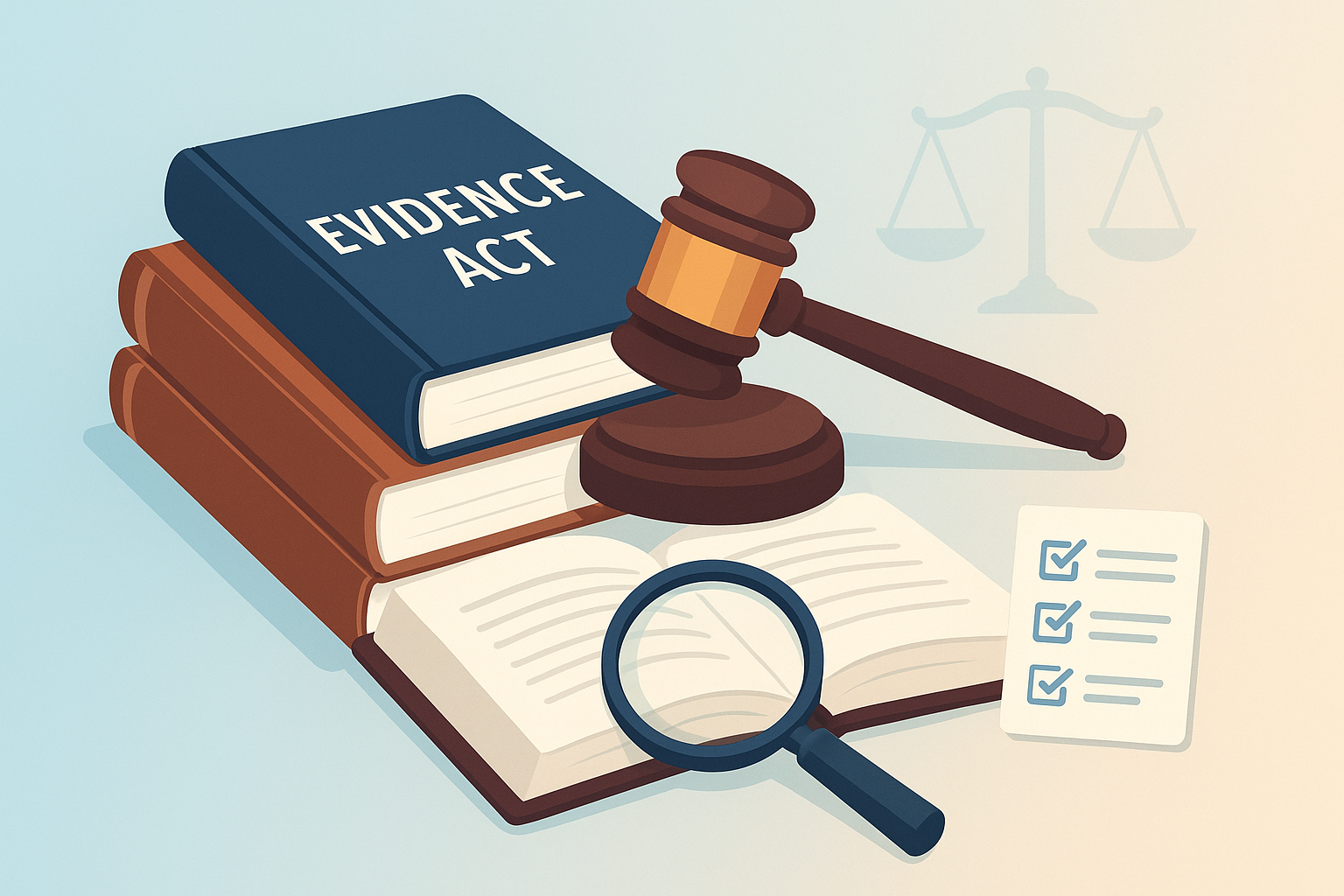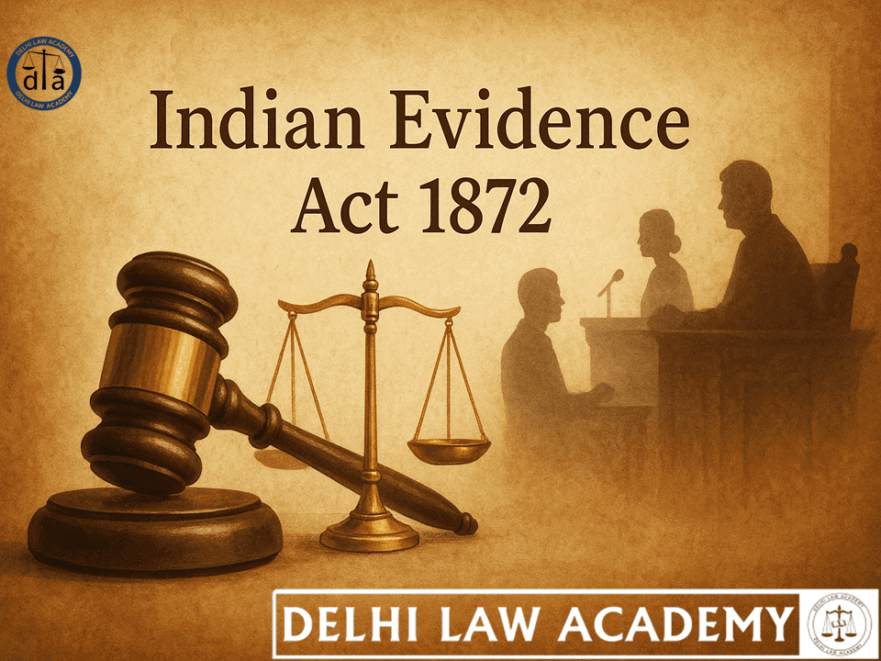
⚖️ RELEVANCY OF OPINIONS OF EXPERTS
• Whether the opinion of a hand writing and finger print expert relevant under the Evidence Act?
• Whether the opinion of a hand writing and finger print expert conclusive under the Evidence Act?
• Whether the uncorroborated testimony of a hand-writing expert sufficient for conviction?
We now proceed to find answers to these questions from a land mark judgment of the Supreme Court.
📘 Preparation for RJS, DJS, PCS (J) and other Judicial Service exams
EVIDENCE ACT EXPLAINED PART 10
The Evidence Act forms the bedrock of any and every Judicial Service exam in the country. Its thorough knowledge is a must for all aspirants of RJS, DJS, PCS (J) and every other Judicial Service exam. To help such aspirants, Delhi Law Academy Jaipur has launched a series of study material modules on all important aspects of this vital part of their syllabus:
📗 RELEVANCY OF OPINIONS OF EXPERTS
Section 45
- • When
- o Court has to form an opinion
- o upon a point of foreign law or of science or art or
- o as to identity of handwriting or finger impressions
- • opinions upon that point
- o of persons specially skilled
- o in such foreign law, science or art or
- o in questions as to identity of handwriting or finger impressions
- • are relevant facts
- • Such persons are called experts
Illustration (c)
- • The question is
- o whether a certain document was written by A
- • Another document is produced
- o which is proved or admitted to have been written by A
- • Opinions of experts on the question
- o whether the two documents were written
- o by the same person or by different persons
- • are relevant
⚖️ Case Study: Ram Narain v. State of UP [1973 SC]
Facts of the case
- • On August 15, 1964, Mannu, a boy about 6 years old, was found missing from the house of the appellant Ramnarain’s relation
- • A post-card (Ext. Ka-1) bearing post office seals dated August 21, 1964 and later an inland letter (Ext. Ka-2) bearing the date October 21, 1964, were received by Gajendra Nath demanding, in the first letter a ransom of Rs 1,000 and in the second a ransom of Rs 5,000 for the return of the boy.
- • Investigation of the case revealed that the appellant Ram Narain was also responsible for kidnapping and wrongfully confining the said child and that it was he who had sent the two anonymous letters demanding ransom.
Conviction
- • Ram Narain was convicted for an offence under Sections 384 and 511 I.P.C. This conviction was solely based on the conclusion that the two anonymous letters had been written by him.
- • The appellant having categorically denied his authorship of those letters, a hand-writing expert was produced in support of the prosecution case. Believing his testimony that the appellant was the writer of those two letters, all the three courts below have agreed in convicting the appellant.
The question
- • The short question raised before us relates to the legality and propriety of the appellant’s conviction on the uncorroborated testimony of the hand-writing expert.
Judgment
- • It is no doubt true that the opinion of a hand-writing expert given in evidence is no less fallible than any other expert opinion adduced in evidence with the result that such evidence has to be received with great caution.
- • But this opinion evidence, which is relevant, may be worthy of acceptance if there is internal or external evidence relating to the document in question supporting the view expressed by the expert
- • If after comparison of the disputed and the admitted writings by the court itself, when the Presiding Officer is familiar with that language, it is considered safe to accept the opinion of the expert then the conclusion so arrived at cannot be assailed
Section 47 Opinion as to handwriting, when relevant
- • When Court has to form an opinion
- o as to the person by whom a document was written or signed
- • opinion of any person
- o acquainted with the handwriting of the person
- o by whom it is supposed to be written or signed
- • is a relevant fact
Illustration
- • The question is
- o whether a given letter is in the handwriting of A, a merchant in London
- • B is a merchant in Calcutta
- o who has written letters to A
- o and received letters purporting to be written by him
- • C is B’s clerk
- o whose duty it was to examine and file B’s correspondence
- • D is B’s broker
- o to whom B habitually submitted letters
- o written by A for advising him thereon
- • Opinions of B, C and D
- o on the question whether the letter is in the handwriting of A
- • are relevant
- o though neither B, C and D ever saw A write
Section 47A Opinion as to digital signature where relevant
- • When the Court has to form an opinion
- o as to the digital signature of any person
- • Opinion of the Certifying Authority
- o which has issued the Digital Signature Certificate
- o is a relevant fact
Section 50 Opinion on relationship, when relevant
- • When Court has to form an opinion
- o as to the relationship of one person to another
- • opinion expressed by conduct
- o as to the existence of such relationship or
- • opinion of any person
- o who, as a member of the family or otherwise
- o has special means of knowledge on the subject
- • is a relevant fact
- • Provided that
- o such opinion shall not be sufficient to prove a marriage
- o in prosecutions u/s 494, 495, 497 or 498 of IPC
Illustration (a)
- • The question is whether A and B were married
- • The fact that they were usually received and treated by their friends as husband and wife is relevant
Illustration (b)
- • The question is whether A was the legitimate son of B
- • The fact that A was always treated as such by members of the familyis relevant
📚 Continue Your Evidence Act Preparation
Don’t stop here! Strengthen your knowledge of the Evidence Act with our other fully solved tests:
📘 Free Study Material for Judiciary Aspirants!
Download our FREE study material prepared by Delhi Law Academy’s expert faculty.
💡 FAQs on Expert Opinions under the Evidence Act
Contact us
📍 Delhi Law Academy – Jaipur Branch
6C, Tower 2, Coaching Hub, Pratap Nagar, Jaipur – 302033
📞 Phone:
+91 9911916552
+91 8447285606
✉️ Email:
contactus@delhilawacademy.com

